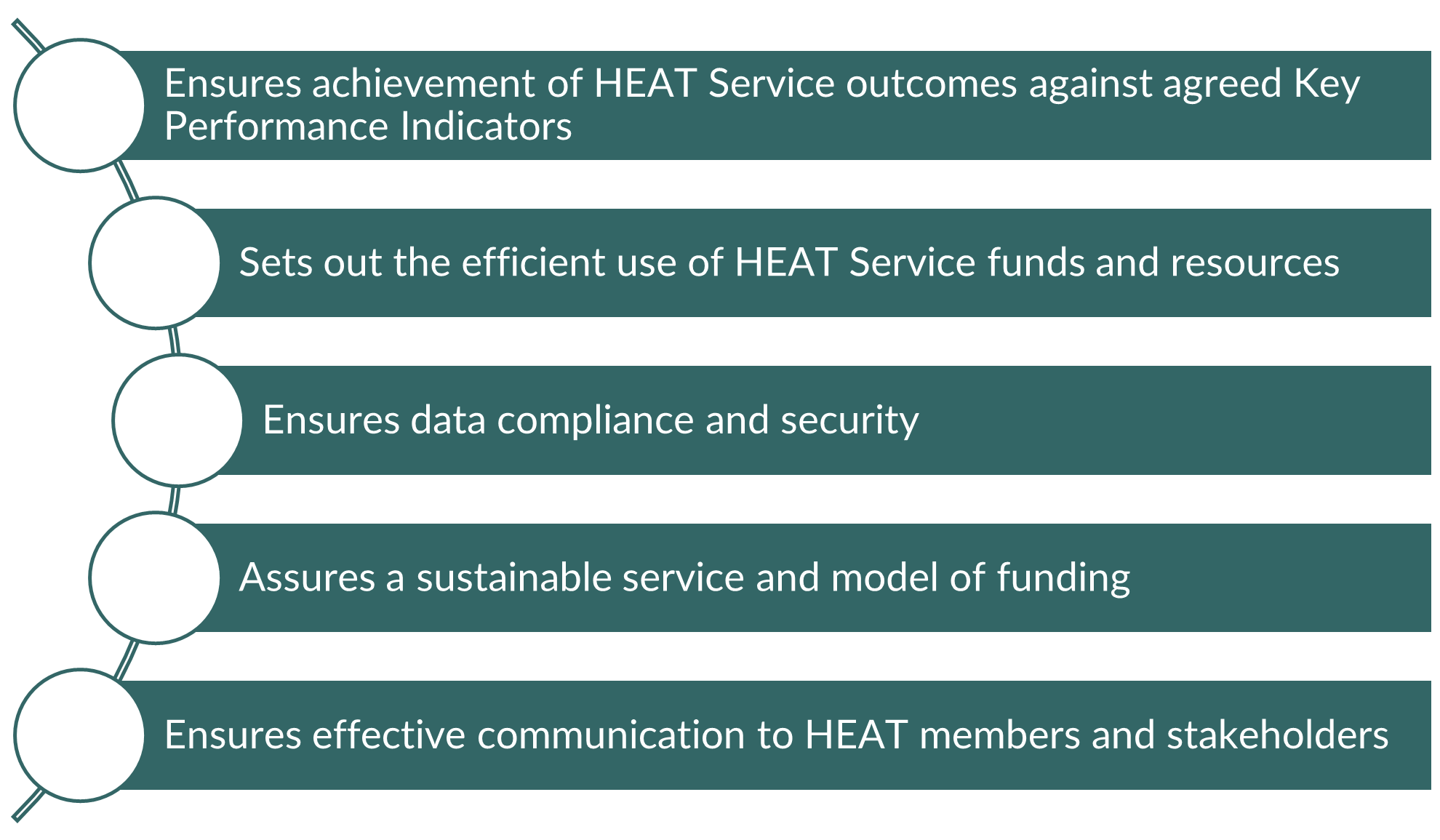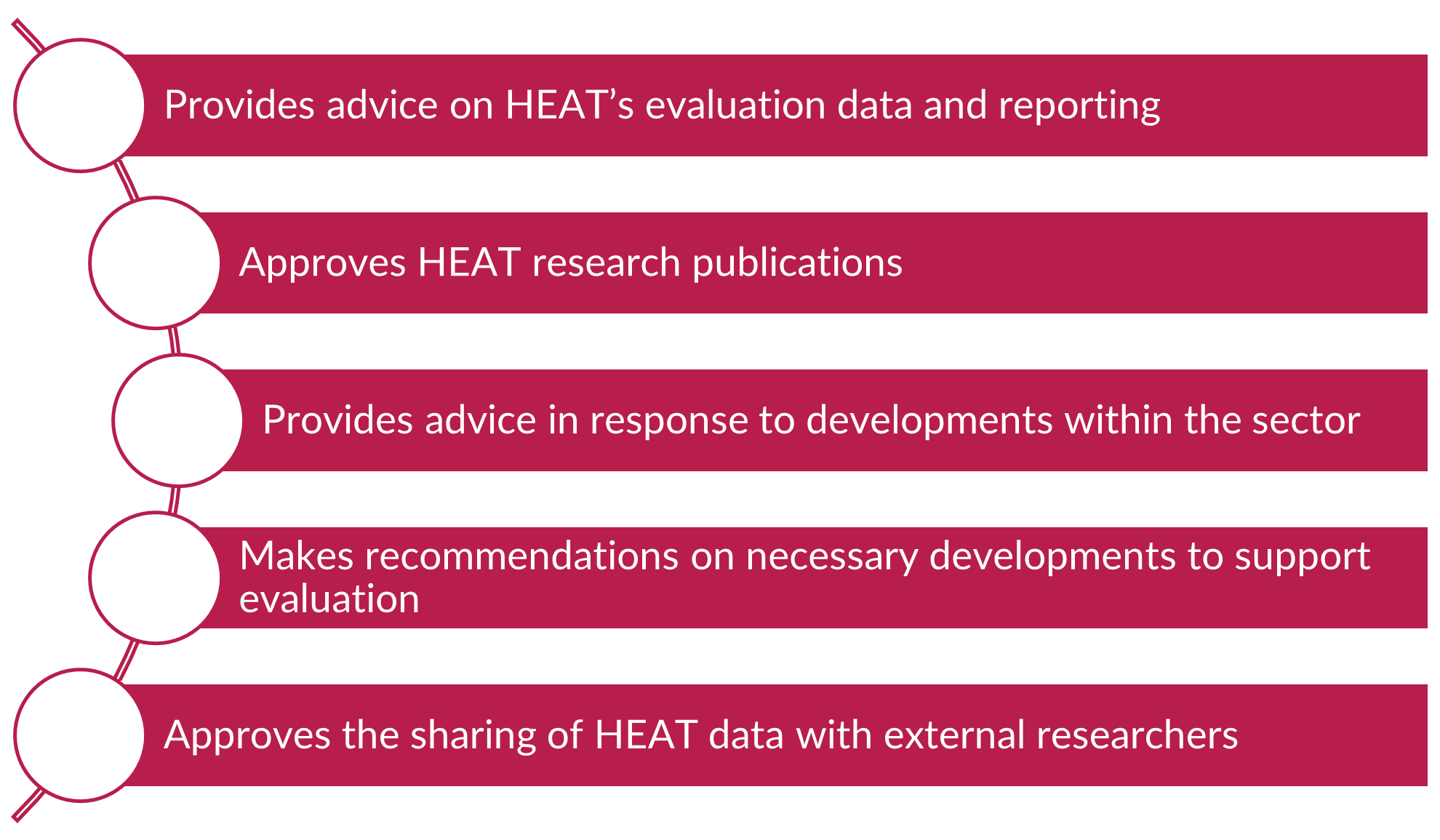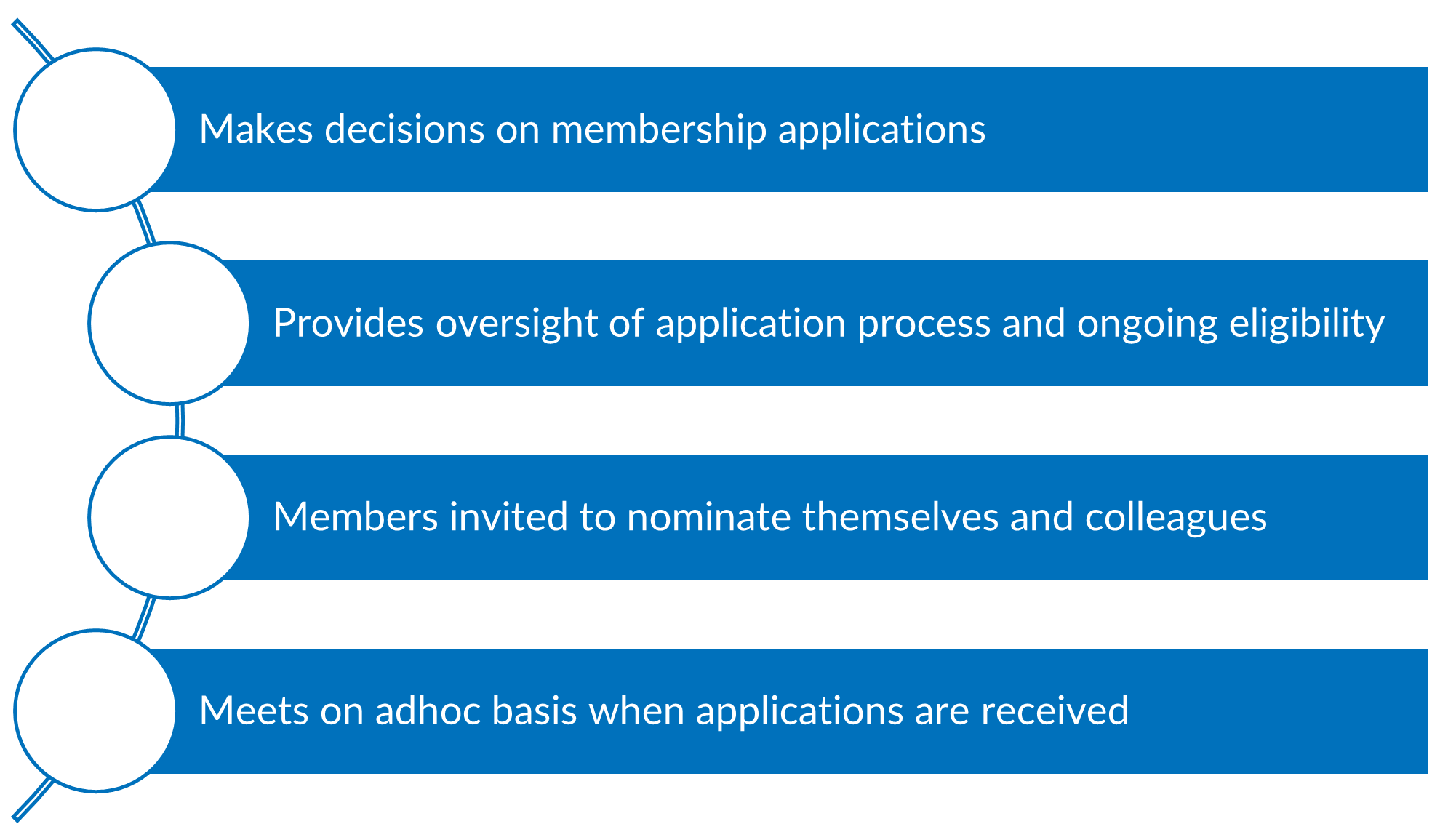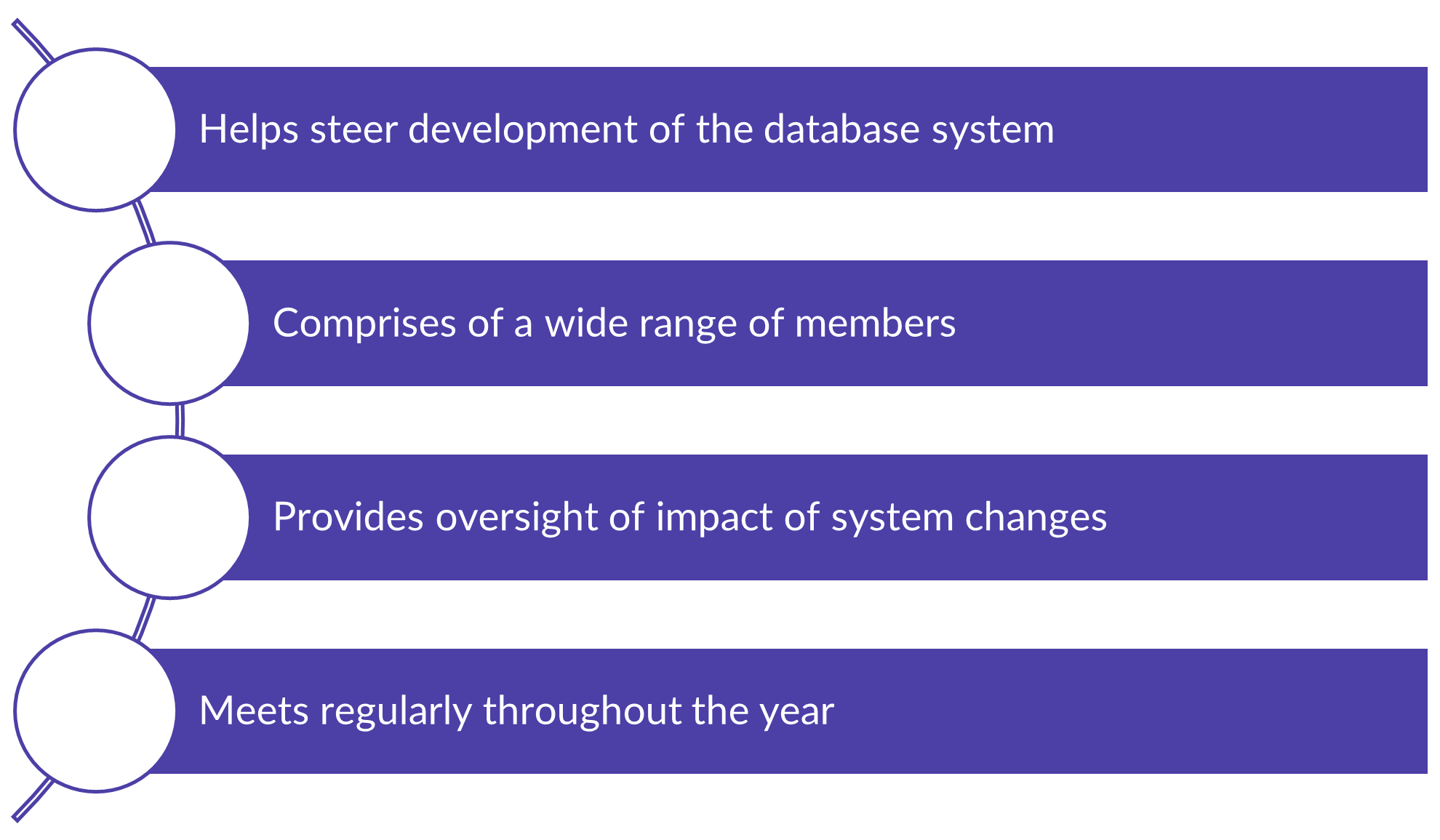Our Governance, Steering and working groups make decisions about the direction of the HEAT Service, setting our ethos, priorities and objectives.

Our seven key objectives
We are a non-profit research collaboration, and our objectives are designed to support and enhance our commitment to working together to build evidence of impact across the education sector. Together, they form the foundation of our efforts as a Service and membership.
Explore these objectives to see how we are making a meaningful impact to ensure the best possible outcome for disadvantaged learners.
Through the provision of a system, data and tools, we support the sector to evaluate the work they are doing to mitigate risks to equality of opportunity in higher education, ensuring it is evidence-based.
We support members to meet the requirements of regulatory bodies and fulfil their social/civic mission(s).
We drive collaboration across our membership sharing in data, systems, expertise and intellectual capital. We collaborate with other organisations in the sector with similar missions.
We build evidence based on aggregate data to further the sector’s understanding around the risks to equality of opportunity in higher education.
We work with our members, to ensure they engage with the evaluation purpose of HEAT and build internal capacity and capability to enable them to realise the benefits of belonging to the HEAT Service.
We are non-profit making, funded by members, allowing us to be apolitical and autonomous. We are inclusive, our Service is open to all those delivering work to mitigate the risks to equality of opportunity in higher education.
We are agile, innovative and responsive, allowing us to adapt to new requirements and changes in regulatory and sector priorities.
Understanding our community and working groups
The HEAT Service was developed by the sector, for the sector and as a collective, members own the Service, which operates on an ‘equal pay, equal say’ basis via annual subscription. HEAT facilities this by inviting members to contribute to our objectives through various working groups, as set out below.
The HEAT Service reports to both the Steering and Governance Groups biannually. This includes an update of the development and activity of all working groups as a fixed-agenda item.
HEAT Governance Group
The purpose of the HEAT Governance Group is to provide strategic direction and leadership to the HEAT Service. overseeing the HEAT Director and functions in their functions and duties.
The HEAT Director provides updates to the Governance Group on:
- Steering Group
- Service progress
- New and future development
- Finance
- Research Group

HEAT Steering Group
The purpose of the HEAT Steering Group is provide oversight of the collaborative service outcomes through a bi-annual review of the HEAT Service plan. Through its membership the group will monitor service outputs and ensure that members are satisfied that the objectives of HEAT are being met.

HEAT Research Group
The HEAT Research Group is intended to help develop the research capacity within the HEAT membership and meets at intervals determined by its constituent members. The Research Group’s development and activity is reported to the Governance and Steering Groups by the HEAT Service as a fixed-agenda item.

HEAT Membership Application Panel
The purpose of this panel is to assess and make decisions on behalf of the wider HEAT membership on applications for membership. They are instrumental in helping smaller organisations to join the Service.

HEAT System Review Panel
The System Review Panel considers feedback from members and makes decisions about system development. Recommendations and activity is reported to the Governance and Steering Groups by the HEAT Service as a fixed-agenda item.

Role/Purpose
The role of the Governance Board is to provide strategic direction and leadership to the HEAT membership. The Board will meet twice yearly at the University of Kent, or by ‘virtual’ attendance.
The HEAT Governance Board sets out to deliver:
- Successful monitoring and achievement of HEAT Service outcomes against agreed KPIs
- Financial monitoring and efficient use of funds and resource
- Effective communication to funders and the wider HEAT membership
- Effective data compliance and security
- Manage the transition to a single sustainable model beyond HEFCE funding
Term
The Terms of Reference are effective from 1st January 2018, and will remain ongoing until terminated by agreement between the parties.
Membership
The HEAT Governance Board:
- Ben Cosh, Pro Vice-Chancellor for Education Modernisation, University of Kent (Chair)
- Anita Jackson, Director of Planning and Student Information, University of Kent
- Daniel Knox, Head of Information Services, University of Kent
- Clare Allison, Head of Outreach and Participation, University of Kent
- Anna Anthony, Director of HEAT, University of Kent
Nominated Higher Education Institution members:
- Samina Khan, University of Oxford
- Mike Kerrigan, Nottingham Trent University
- Liz Hurley, University of Leeds
- Nathaniel Pickering, University of Greenwich
- Lauren Bellaera, The Brilliant Club
- Richard Thomas, Southampton Solent University
Roles and Responsibilities
The Board is accountable for:
- Removing obstacles to the successful delivery of the Service
- Maintaining the focus of the Service at all times on the agreed scope and outcomes
- Monitoring and managing factors outside the Service’s control that are critical to its success
The membership of the Board will commit to:
- Champion the Service within the university and across the sector
- Make timely decisions and take action so as to prevent delay or interruption to the Service
- Notifying members of the group, as soon as practical, of any matter arising which may be
- Deemed to affect the development of the Service
- Attendance at all meetings and if necessary nominate a proxy
Members of the Board will expect:
- To be provided with complete, accurate and meaningful information in a timely manner
- To be given reasonable time to make key decisions
- To be alerted to potential risks and issues that could impact the Service as they arise
- Open and honest discussion, without resort to any misleading assertions
- Ongoing ‘health checks’ to verify the overall status and ‘health’ of the Service
Meetings
- All meetings will be chaired by Ben Cosh
- A meeting quorum will be 4 members of the Board, comprising at least equal representation from the University of Kent (not including the chair) and nominated HEI members.
- Decisions will be made by consensus (i.e. members are satisfied with the decision even though it may not be their first choice). Where consensus is not reached the Chair will make the final decision.
- Meeting documentation will be provided by HEAT, including:
– Agendas and supporting papers
– Meeting notes and information - If required, subgroup meetings will be arranged outside of Governance scheduled meetings, at a time convenient to subgroup members
Amendment, Modification or Variation
The Terms of Reference may be amended, varied or modified in writing after consultation and agreement by all members of the Governance Board.
Role / Purpose
The purpose of the HEAT Steering Group is to provide an oversight of the collaborative Service outcomes through a bi-annual review of the HEAT Service plan. Through its membership the group will monitor Service outputs and ensure that members are satisfied that the objectives of HEAT are being met.
Objectives
- To provide strategic advice to the HEAT Central Team on longer term development and sustainability of the HEAT Service
- To receive and review information and examples of Service outputs e.g. datasets and evidence and to ensure that this information is appropriate
- To provide advice on future planning of the HEAT Service
- To review the HEAT budget and advise on budget spend
- To review policy and receive updates from other partners such as the Office for Students and Department for Education to ensure that the HEAT Service remains fit for purpose
- To ensure that HEAT positions itself and its outputs appropriately in relation to sector and government changes
Membership
Group Membership is by self-nomination, but the Service Director will ensure that there is appropriate representation on the group to mirror the membership. Membership may be limited for practical reasons and final decisions on membership will lie with the Governance Group. If a member leaves the Steering Group, their organisation will be able to nominate a replacement. If no replacement is possible, the Service Director may approach an alternative member to ensure the group remains quorate. Representation on the Steering Group is by organisation and does not follow individuals.
In addition, the group will invite the following organisations to be in regular attendance (though without voting or decision making rights):
- A representative from Office for Students
- A representative from the Department for Education (Data)
The group may invite other representatives to attend meetings when their expertise, input or judgement is required.
Meetings
Formal meetings will take place twice a year in (approximately) December and July. For a meeting to be deemed quorate and agree decisions at least 1 more than fifty percent of representatives must be present (excluding the HEAT Central Team).
Amendments, modifications and Variation
The Terms of Reference may be amended, modified or varied in writing following consultation and agreement by all HEAT members, and ratification by the Governance Board.
Learn more about our Community
Discover more about our members
Explore more about our community and the membership types available.



